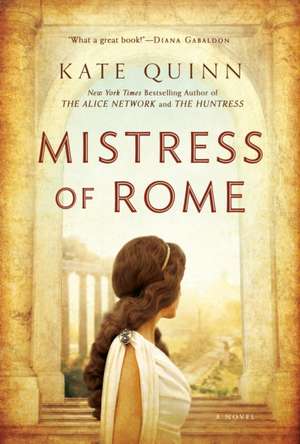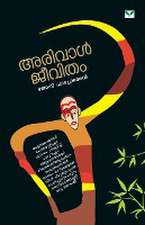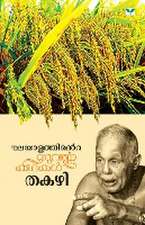Mistress of Rome
Autor Kate Quinnen Limba Engleză Paperback – 31 mar 2010 – vârsta de la 18 ani
An exciting debut: a vivid, richly imagined saga of ancient Rome from a masterful new voice in historical fiction
Thea is a slave girl from Judaea, passionate, musical, and guarded. Purchased as a toy for the spiteful heiress Lepida Pollia, Thea will become her mistress's rival for the love of Arius the Barbarian, Rome's newest and most savage gladiator. His love brings Thea the first happiness of her life-that is quickly ended when a jealous Lepida tears them apart.
As Lepida goes on to wreak havoc in the life of a new husband and his family, Thea remakes herself as a polished singer for Rome's aristocrats. Unwittingly, she attracts another admirer in the charismatic Emperor of Rome. But Domitian's games have a darker side, and Thea finds herself fighting for both soul and sanity. Many have tried to destroy the Emperor: a vengeful gladiator, an upright senator, a tormented soldier, a Vestal Virgin. But in the end, the life of the brilliant and paranoid Domitian lies in the hands of one woman: the Emperor's mistress.
Thea is a slave girl from Judaea, passionate, musical, and guarded. Purchased as a toy for the spiteful heiress Lepida Pollia, Thea will become her mistress's rival for the love of Arius the Barbarian, Rome's newest and most savage gladiator. His love brings Thea the first happiness of her life-that is quickly ended when a jealous Lepida tears them apart.
As Lepida goes on to wreak havoc in the life of a new husband and his family, Thea remakes herself as a polished singer for Rome's aristocrats. Unwittingly, she attracts another admirer in the charismatic Emperor of Rome. But Domitian's games have a darker side, and Thea finds herself fighting for both soul and sanity. Many have tried to destroy the Emperor: a vengeful gladiator, an upright senator, a tormented soldier, a Vestal Virgin. But in the end, the life of the brilliant and paranoid Domitian lies in the hands of one woman: the Emperor's mistress.
| Toate formatele și edițiile | Preț | Express |
|---|---|---|
| Paperback (2) | 51.71 lei 3-5 săpt. | +29.78 lei 5-11 zile |
| Headline – 10 iun 2010 | 51.71 lei 3-5 săpt. | +29.78 lei 5-11 zile |
| Berkley Publishing Group – 31 mar 2010 | 107.45 lei 3-5 săpt. |
Preț: 107.45 lei
Nou
Puncte Express: 161
Preț estimativ în valută:
20.56€ • 21.39$ • 16.98£
20.56€ • 21.39$ • 16.98£
Carte disponibilă
Livrare economică 24 martie-07 aprilie
Preluare comenzi: 021 569.72.76
Specificații
ISBN-13: 9780425232477
ISBN-10: 0425232476
Pagini: 470
Dimensiuni: 144 x 214 x 28 mm
Greutate: 0.38 kg
Editura: Berkley Publishing Group
ISBN-10: 0425232476
Pagini: 470
Dimensiuni: 144 x 214 x 28 mm
Greutate: 0.38 kg
Editura: Berkley Publishing Group
Recenzii
"...for sheer entertainment, drama, and page-turning storytelling, this tumultuous debut novel is well worth reading.
-Library Journal
-Library Journal
Extras
One
APRIL, A.D. 82
The atmosphere at the Mars Street gladiator school was contented, convivial, and masculine as the tired fighters trooped in through the gates. Twenty fighters had sallied out to join the main battle of the Cerealia games, and fourteen had come back alive. A good enough average to make the victors swagger as they filed through the narrow torch- lit hall, dumping their armor into the waiting baskets.
“. . . hooked that Greek right through the stomach! Prettiest piece of work I . . .”
“. . . see that bastard Lapicus get it in the back from that Gaul? Won’t be looking down his long nose at us anymore . . .”
“. . . hard luck on Theseus. Saw him trip in the sand . . .”
Arius tossed his plumed helmet into the waiting basket, ignoring the slave who gave him cheery congratulations. The weapons had already been collected, of course— those got snatched the moment the fighting was done.
“First fight?” A chatty Thracian tossed his own helmet into the basket atop Arius’s. “Mine, too. Not bad, huh?”
Arius bent to unlace the greaves about his shins.
“Nice work you did on that African today. Had me one of those scrawny Oriental Greeks; no trouble there. Hey, maybe next time I’ll get Belleraphon and then I’ll really make my fortune.”
Arius unlaced the protective mail sleeve from his sword arm, shaking it off into the basket. The other fighters were already trooping into the long hall where they were all fed, whooping as they filed along the trestle tables and grabbed for the wine jugs.
“Quiet, aren’t you?” The Thracian jogged his elbow. “So where you from? I came over from Greece last year— ”
“Shut up,” said Arius in his flat grating Latin.
“What?”
Brushing past the Thracian into the hall, he ignored the trestle tables and the platters of bread and meat. He leaned over and grabbed the first wine jug he saw, then headed off down another small ill- lit hallway. “Don’t mind him,” he heard another fighter growl to the Thracian. “He’s a sour bastard.”
Arius’s room in the gladiator barracks was a tiny bare cell. Stone walls, a chair, a straw pallet, a guttering tallow candle. He sank down on the floor, setting his back against the wall and draining half the jug in a few methodical gulps. The cheap grapes left a sour taste in his mouth. No matter. Roman wine was quick, and all he wanted was quick.
“Knock knock!” a voice trilled at the door. “I hope you aren’t asleep yet, dear boy.”
“Piss off, Gallus.”
“Tut, tut. Is that any way to treat your lanista? Not to mention your friend?” Gallus swept in, vast and pink- fleshed in his immaculate toga, gold gleaming on every finger, magnolia oil shining on every curled hair, a little silk- decked slave boy at his side. Owner of the Mars Street gladiator school.
Arius spat out a toneless obscenity. Gallus laughed. “Now, now, none of that. I came to congratulate you. Such a splendid debut. When you sent the head flying clean off that African . . . so dramatic! I was a little surprised, of course. Such dedication, such savagery, from one who swore not an hour before that he wouldn’t fight at all . . .”
Arius took another deep swallow of wine.
“Well, how nice it is to be right. The first time I saw you, I knew you had potential. A little old for the arena, of course— how old are you, anyway? Twenty- five, thirty? No youngster, but you’ve certainly got something.” Gallus waved his silver pomander languidly. Arius looked at him.
“You’ll get another fight in the next games, of course. Something a little bigger and grander, if I can persuade Quintus Pollio. A solo bout, perhaps. And this time”— a glass- sharp glance— “I won’t have to worry that you’ll deliver, will I.”
Arius aligned the wine jug against the wall. “What’s a rudius?” The words surprised him, and he kept his eyes on the jug. “A rudius?” Gallus blinked. “Dear boy, wherever did you hear about that?”
Arius shrugged. They had all been waiting in the dark under the Colosseum before their bout, nervous and excited, fingering their weapons. Here’s to a rudius for all of us, one of the others had muttered.
A man who had died five minutes later under a trident before Arius could ask him what it meant.
“A rudius is a myth,” Gallus said airily. “A wooden sword given from the Emperor to a gladiator, signaling his freedom. I suppose it’s happened once or twice for the stars of the arena, but that hardly includes you, does it? One bout, and not even a solo bout— you’ve got a long way to go before you can call yourself a success, much less a star.”
Arius shrugged.
“Such a dear boy.” Gallus reached out and stroked Arius’s arm. His plump fingers pinched hard, and his black peppercorn eyes locked onto Arius’s with bright curiosity.
Arius reached out, picked up the tallow candle beside him, and calmly poured a stream of hot wax onto the soft manicured hand. Gallus snatched his burned fingers away. “We really will have to do something about your manners,” he sighed. “Good night, then. Dear boy.”
As soon as the door thudded shut, Arius picked up the wine jug and drank off every drop. Letting the jug fall, he dropped his head back against the stones. The room wasn’t spinning anymore. Not enough wine. He closed his eyes.
He hadn’t meant to fight. He’d meant what he’d told Gallus, standing in the dim passage underneath the arena, hearing the roars of the crowd and the screams of the wounded men and the whimpers of the dying animals. But the sword had been placed in his hand, and he’d gone out with the others in the brisk group battle that served to whet the crowd’s appetite for the solo bouts, and he’d seen the African he’d been paired to fight . . . and the black demon had uncoiled from its self- devouring circles in his brain and roared joyously down the straight and simple path of murder.
Then suddenly he had been standing blinking in the sunlight with another man’s blood on his face and cheers pouring down on his head like a swarm of bees. Just thinking about those cheers brought an icy sweat. The arena. That hellish arena. It spoiled his luck every time. Even slaughtering its guards had failed to get him killed. After that savage beating seven months ago, he had awakened in bed. Not a soft bed; Gallus didn’t waste luxuries on half- dead slaves. Dragging himself painfully into the light, he heard for the first time Gallus’s voice: high, modulated, reeking of the slums.
“Can you hear me, boy? Nod if you understand. Good. What’s your name?”
Hoarsely he croaked it out.
Gallus tittered. “Oh, that’s absurd. A Briton, aren’t you? You barbarians always have impossible names. Well, it won’t do. We’ll call you Arius. A bit like Aries, the god of war. Quite catchy, yes, we can do something with that.
“Now. I’ve bought you, and paid a pretty price, too, for a half- dead troublemaker. Yes, I know exactly why you were sentenced to the arena. You were part of a chain gang making repairs on the Colosseum, until you strangled a guard with his own whip. Very foolish, dear boy. Whatever were you thinking?” Gallus snapped for his little slave boy with the tray of sweetmeats. “Well, then”— eating busily— “you can tell me for starts how you ended up working a chain gang in the Colosseum.”
“Salt mines,” Arius forced out through swollen lips. “In Trinovantia. Then Gaul.”
“Dear me. And how long have you been working in those sinkholes?”
Arius shrugged. Twelve years? He wasn’t sure.
“A long time, clearly. That explains the strength of the arms and chest.” A plump finger traced over Arius’s shoulders. “Hauling rocks of salt up and down mountains for years; oh yes, it builds fine men.” A last lingering stroke. “One doesn’t learn to use a sword in the mines, however. Where did you learn that, eh?”
Arius turned his face toward the wall.
“Well, no matter. Time to listen. You’ll do your fighting for me from now on, when and where I say. I am a lanista. Know what that is? No? I thought your Latin was a little rough. Everything about you is a little rough, isn’t it? A lanista is a trainer, dear boy, of gladiators. You’re going to be a gladiator. It’s a good life as they go— women, riches, fame. You’ll take the oath now, and begin training as soon as those bones patch up. Repeat after me: ‘I undertake to be burnt by fire, to be bound in chains, to be beaten by rods, and to die by the sword.’ That’s the gladiator’s oath, dear boy.”
Arius told him hoarsely what he could do with his oath, and collapsed back into blackness.
It had been days before he could get out of bed, weeks before his bones were whole, and nearly five months before his training in the gladiators’ courtyard was complete. His fellow fighters were petty criminals and bewildered slaves scummed off the bottom of the market: a cheap cut- rate bunch. Arius slid indifferently into the school’s routine: just one more thug with Gallus’s crude crossed- swords tattoo on his arm. Better than the mines.
Rudius. The word came back to him. Sounded like a snake, not a wooden sword. He didn’t see how getting a wooden sword from the Emperor made you free, but the mist- shrouded mountains of home rose up before his eyes, impossibly fresh and green and lovely. A wooden sword. He used wooden swords every day when he trained. He always broke them, hitting too hard. An omen? He thought back to the white- robed Druids of his childhood, dimly remembered, smelling of mistletoe and old bones, reading the gods in every leaf’s fall. They’d call it a bad omen, breaking a wooden sword. But he’d never had many good omens in his life.
He shook off the thought of home. The Mars Street school wasn’t bad. No women and riches as Gallus had promised, but at least no merciless sun, no chains eating the flesh off his ankles, no uneasy sleep on bare mountainsides. Here there were blankets and bread for the days, wine to drown the nights, a quick death around the corner. Better than the mines. Nothing could be worse than the mines. The applause of the games fans flickered uneasily through his mind.
THEA
From the moment I saw Senator Marcus Vibius Augustus Norbanus, I longed to fix him up: give him a proper haircut, get the ink stains off his fingers, take his slaves to task for pressing his toga so badly. He had been divorced for more than ten years, and slaves take advantage when there’s no mistress of the house. I would have bet five coppers that Marcus Norbanus, who had been consul four times and was the natural grandson of the God- Emperor Augustus, poured his own wine and put away his own books just like any pleb widower. “Your name, girl?” he asked, as I offered a tray of little sweet marchpane pastries.
“Thea, sir.”
“A Greek name.” He had deep- set eyes; friendly, penetrating, aloof. “But not, I think, a Greek. Something too long about the vowels, and the shape of the eyes is wrong. Antiochene, perhaps, but I would guess Hebrew.”
I smiled in assent, backing away and examining him covertly. He had a crooked shoulder that pulled him off- balance and made him limp, but it was hardly visible unless he was standing. Seated he was still a fine figure of a man, with a noble patrician profile and thick gray hair.
Poor Marcus Norbanus. Your bride will eat you alive. “Senator!” Lepida danced in, fresh and lovely in carnelian silk with strands of coral about her neck and wrists. Fifteen now, as I was; prettier and more poised than ever. “You’re here early. Eager to see the games?”
“The spectacle always provides a certain interest.” He rose and kissed her hand. “Though I usually prefer my library.”
“Well, you must change your opinion. For I am quite mad for the games.”
“Her father’s daughter, I see.” Marcus made a courtly nod to Pollio.
Lepida’s father swept his eyes with just a hint of contempt over Marcus’s uncurled hair, the carelessly pressed toga, the mended sandal strap. He himself was immaculate: snowy linen pleated razor- sharp and perfume heavy enough to tingle the nostrils. Still, no one would ever mistake him for a patrician. Or Marcus Norbanus for anything else.
“So, you really know the Emperor’s niece?” Lepida asked her betrothed as we left the Pollio house and sallied out into the April sunshine. Her blue eyes were wide with admiration. “Lady Julia?”
“Yes, since she was small.” Marcus smiled. “She and her half- sister were playmates of my son’s when they were very young. They haven’t met since they were children— Paulinus is with the Praetorians now— but I still visit Lady Julia now and then. She’s been very downcast since her father died.”
The wedding morning of Lady Julia and her cousin Gaius Titus Flavius burst clear and blue as we went to watch them join hands at the public shrine— on foot, since the litters would never get through the crowds. I was jostled from side to side by shoving apprentices, avid housewives, beggars trying to slip their hands into my purse. A baker in a flour- sprinkled apron trod heavily on my foot, and I tripped.
Marcus Norbanus caught my arm with surprising agility, setting me on my feet before I could fall. “Careful, girl.”
“Thank you, sir.” I fell behind, chagrined. He really was far too kind to be Lepida’s husband. I’d been praying devotedly for an ogre.
“Oh, look!” Abandoning Marcus’s arm, Lepida elbowed her way to the front of the crowd. “Look, there they are!”
I peered over Pollio’s shoulder. The shrine of Juno, goddess of marriage— and the tall ruddy- cheeked young man beside the priest must be the bridegroom. He was in high spirits, jostling and joking with his attendants. “He’s handsome,” Lepida announced. “Fat, though. Don’t you think?”
Marcus looked amused. “The Flavians tend toward heaviness,” he said mildly. “A family trait.”
“Oh. Well, he’s not really fat, is he? Just imposing.”
The blast of Imperial trumpets brazened in our ears. Servants in Imperial livery began to wind past. The Praetorian Guard lined the road in their ceremonial breastplates and red plumes, making way for the bride. “Is that Lady Julia?” Lepida craned her neck.
I studied the Emperor’s niece curiously— the one who supposedly wanted to be a Vestal Virgin. She was very small, her hair straw- pale, her figure straight and childlike in the white robe. The flaming bridal veil drew all the color out of her face. Her pale lips were smiling, but she didn’t really look— well, bridal.
“She doesn’t have the complexion for red,” my mistress said, too softly for her betrothed to hear. “Her skin’s like an unripe cheese. I’ll look much better at my wedding.”N
The bridal pair joined hands at the shrine, speaking the ritual words: Quando tu Gaius, ego Gaia. They exchanged the ritual cake, the rings.
The marriage contracts were signed. The priest intoned prayers, and a bellowing white bull gave its blood in a gout over the marble steps as a sacrifice to Juno. Usually Imperial weddings were conducted more privately, but Emperor Domitian was a lover of public pomp. So was the public.
“She should smile,” Lepida criticized. “No one wants to see a bride looking like a corpse on her own wedding day.”
Before the procession, the groom had to wrest his bride from her mother’s arms in symbolic theft. Lady Julia’s mother was dead; her uncle stood in for her. She folded the red veil back over her pale hair and walked meekly into his arms. As the bridegroom used both hands to jerk her away, my gaze shifted to the Emperor.
He was a tall man, vigorous and well made, a little more than twice my age, reflecting back the sun in his gold- embroidered purple cloak and golden circlet. Thickset Flavian shoulders that would run to fat in his old age. Ruddy cheeks and broad, friendly features.
My eyes shifted back to his niece, huddled in the arm of her new husband. I felt sorry for her. A slave feeling sorry for a princess— I don’t know why. Then her eyes shifted, falling for a moment on mine, and in the instant before I dropped my gaze to the ground I saw that on the day of her own wedding— a bright and beautiful spring day when the whole world stretched before her— Lady Julia Flavia felt lost and terrified and alone.
“Well, that’s that!” Pollio clapped his hands, and I jumped. “We’d better go on to the arena. The first show is very splendid, I assure you. I found a dozen of the strangest striped horses from an African trader; he called them zebras— ”
On Senator Norbanus’s suggestion, we took a hired litter on a shortcut through Mars Street. I trotted behind on foot while Lepida squeezed in beside her betrothed, hanging on his every word, looking up at him through long black lashes. A spider reeling in the fly.
Pollio was still droning on about how clever he had been to buy twenty tigers at a bargain price from India when the litter was forced to pull up short. A huge cart blocked the road, ironbound and padlocked, and a litter borne by six golden- haired Greeks. As we watched, a gate barred like a prison swung open and a team of men marched out. Armor gleamed beneath their purple cloaks as they climbed into the wagon, and their faces were somber under their helmets. Gladiators, on their way to the Colosseum.
“Gallus’s fighters.” Pollio twitched back the curtains for a better look, frowning. “ Third- raters, all of them. Still, they make good bait for the lions. So would Gallus himself, if you ask me. That’s him in the litter.”
A fat man with a fringe of oiled curls around his forehead leaned out through the orange silk curtains to shout through the gates. “You’re holding us up, dear boy.”
Out through the gates of Gallus’s school strode a big man, russet- haired, a Gaul or a Briton. He wore heavy iron plates over his shins, a green kilt, an absurd helmet with green plumes. A mail sleeve protected his fighting arm, the leather straps passing over his unprotected chest and scarred back. His face was granite- still— and I knew him.
The slave. The one who had fought back in the games of the Emperor’s accession months ago. I remembered weeping a little for him, the same way I wept when the lions fell in the arena with spears through their great chests. I’d thought he was dead. Even after the Emperor decreed mercy, they’d had to drag him out on a hook like they did the dead lions. But he wasn’t dead. He was back: a gladiator.
“Hurry up, Arius,” the lanista called impatiently from the litter. “We’re blocking the road.”
He caught the side of the wagon and vaulted up. Arius. So that was his name.
For once, I was longing to see the games.
The underground levels of the Colosseum hummed like the pipes of an aqueduct. Slaves rushed through the torch- lit passages, some with whetstones to sharpen the weapons, some with sharp sticks to prod the animals into a fury before they were released up into the arena, some with great rakes to scrape up the dead. Somewhere a lion screamed, or maybe a dying man.
“The main battle’s in two hours,” a steward barked at Gallus in greeting, eyes raking over the gladiators. “Keep them out of the way till then. Which one’s the Briton? He goes after the tigers finish off those prisoners.”
A few hissed words from Gallus, and Arius found himself shunted down a dark passage. Spring warmth never penetrated the bowels of the Colosseum; the passages were dank and cold. Fine clay dust filtered down, shaken loose by the vibrations of the cheers.
A pulley carried Arius to the upper levels; a slave led him to a gate and hastily shoved a sword and heavy shield at him. “Luck to you, gladiator.” Arius waited, rasping a mailed finger up and down the edge of the blade. Against the darkness he saw a wooden sword. The applause died down. Dimly he heard the voice of the games announcer: “And now . . . wilds of Britannia . . . we bring you . . . Arius the Barbarian . . . playing the part of . . .”
With a clank of machinery the heavy gate cranked up. Blinding sunlight flooded the passage.
“ACHILLES, THE GREATEST WARRIOR IN THE WORLD!”
The cheering hit him like a wall as he strode out into the sunlight. Fifty thousand voices shouting his name. A blur of bright silks and white togas, pale circles of faces and black circles of open mouths, backed by a roof of dazzling blue sky. He’d never seen so many people in his life.
He caught himself staring, and slammed down his visor. No need to know who Achilles was, or what kind of part he was playing. Killing was killing.
The demon uncoiled joyfully in his gut.
The announcer’s voice again, hushing the cheers. “And now, from the wilds of Amazonia, we bring you fitting opponents to the mighty hero Achilles— ”
The gate at the other end of the arena rumbled. Arius shrugged his cloak off and his sword up, shifting into a crouch.
“THE QUEEN OF THE AMAZONS AND HER CHAMPIONS!” Arius’s blade faltered.
Women. Five women. In plumed golden helmets and crescentmoon shields and gold anklets. Breasts bare for the audience to leer at. Slim bright swords raised high. Lips clamped into hard lines. The demon rage drained away. Left him cold and shaking. His sword point dropped, brushed against the sand.
The red- plumed leader let out a kestrel shriek as she swooped down toward him.
“Oh, damn it,” he snarled, and brought up his sword.
He picked them off one at a time. The smallest first. No older than fourteen. She stabbed at him with more desperation than skill. He killed her quickly. Then the dark- haired one with the birthmark on her shoulder. He clipped the sword out of her hand, turning his eyes away as he hewed her down. Every stroke lasted a century.
In extreme slow motion he saw the leader cry out, trying to pull them together. She knew what she was doing. Charging together, they might have brought him down. But they panicked and scattered. And, to the raucous enjoyment of the crowd, he chased them down one at a time and slew them.
He just tried to do it fast.
The leader in her brave scarlet plumes, she was the last. She put up a good fight, catching his sword again and again on her slim shield. Her blade landed twig- light against his own. Her eyes showed huge and wild through the visor.
He knocked her sword aside and drove his shield boss against her unprotected breast. Her neck arced in agony. She crumpled to the sand like a broken clay figurine.
Not dead. Not yet. Just strangling on her own blood, crushed ribs trying to expand. He took a tired step forward to cut her throat.
“Mitte! Mitte!”
The cry assailed his ears, and he looked up dumbly. All across the tiers of spectators, the thumbs called for mercy. The cheers were good- natured, the opinion unanimous: mercy for the last of the Amazons.
His eyes burned. Sweat. He flung the blade away and dropped to one knee to slide an arm under her shoulders. She was bleeding everywhere—
Her eyes swept him feebly. A swaying hand reached up to tilt back his visor. And then he was jolted all the way down to his bones as she spoke to him in a language he had not heard for more than a dozen years. His own language.
“Please,” she rasped.
He stared at her.
She choked again on her own blood. “Please.”
He looked down into those great, desperate eyes.
“Please.”
He slid his hand up into her hair, turning her head back to expose the long throat. She closed her eyes with a rattling sigh. He eased his blade into the soft pulse behind her jaw.
When her crushed body was cold in his arms, he looked up. His audience had gone silent. He rose, stained all over with her blood and weighed down by unbelieving eyes.
The demon’s fury roared up, and with all his strength he hewed his sword sideways against the marble wall. He struck again and again, feeling the muscles tear across his back, and at last the blade snapped in two with a dissonant crack. He flung the pieces away, spat on them, then ripped the helmet from his head and flung that after.
Rage surged up in his throat and he shouted— no curses, just a long wordless roar.
They applauded him.
Applauded.
They cheered, they shouted, they screamed praise down on his head like a stinging rain. They threw coins, they threw flowers, they surged upright and shrieked his name. They stamped their feet and rocked the marble tiers.
It was only then that he wept, standing alone in the great arena surrounded by the bodies of five women and a thousand downward- drifting rose petals.
APRIL, A.D. 82
The atmosphere at the Mars Street gladiator school was contented, convivial, and masculine as the tired fighters trooped in through the gates. Twenty fighters had sallied out to join the main battle of the Cerealia games, and fourteen had come back alive. A good enough average to make the victors swagger as they filed through the narrow torch- lit hall, dumping their armor into the waiting baskets.
“. . . hooked that Greek right through the stomach! Prettiest piece of work I . . .”
“. . . see that bastard Lapicus get it in the back from that Gaul? Won’t be looking down his long nose at us anymore . . .”
“. . . hard luck on Theseus. Saw him trip in the sand . . .”
Arius tossed his plumed helmet into the waiting basket, ignoring the slave who gave him cheery congratulations. The weapons had already been collected, of course— those got snatched the moment the fighting was done.
“First fight?” A chatty Thracian tossed his own helmet into the basket atop Arius’s. “Mine, too. Not bad, huh?”
Arius bent to unlace the greaves about his shins.
“Nice work you did on that African today. Had me one of those scrawny Oriental Greeks; no trouble there. Hey, maybe next time I’ll get Belleraphon and then I’ll really make my fortune.”
Arius unlaced the protective mail sleeve from his sword arm, shaking it off into the basket. The other fighters were already trooping into the long hall where they were all fed, whooping as they filed along the trestle tables and grabbed for the wine jugs.
“Quiet, aren’t you?” The Thracian jogged his elbow. “So where you from? I came over from Greece last year— ”
“Shut up,” said Arius in his flat grating Latin.
“What?”
Brushing past the Thracian into the hall, he ignored the trestle tables and the platters of bread and meat. He leaned over and grabbed the first wine jug he saw, then headed off down another small ill- lit hallway. “Don’t mind him,” he heard another fighter growl to the Thracian. “He’s a sour bastard.”
Arius’s room in the gladiator barracks was a tiny bare cell. Stone walls, a chair, a straw pallet, a guttering tallow candle. He sank down on the floor, setting his back against the wall and draining half the jug in a few methodical gulps. The cheap grapes left a sour taste in his mouth. No matter. Roman wine was quick, and all he wanted was quick.
“Knock knock!” a voice trilled at the door. “I hope you aren’t asleep yet, dear boy.”
“Piss off, Gallus.”
“Tut, tut. Is that any way to treat your lanista? Not to mention your friend?” Gallus swept in, vast and pink- fleshed in his immaculate toga, gold gleaming on every finger, magnolia oil shining on every curled hair, a little silk- decked slave boy at his side. Owner of the Mars Street gladiator school.
Arius spat out a toneless obscenity. Gallus laughed. “Now, now, none of that. I came to congratulate you. Such a splendid debut. When you sent the head flying clean off that African . . . so dramatic! I was a little surprised, of course. Such dedication, such savagery, from one who swore not an hour before that he wouldn’t fight at all . . .”
Arius took another deep swallow of wine.
“Well, how nice it is to be right. The first time I saw you, I knew you had potential. A little old for the arena, of course— how old are you, anyway? Twenty- five, thirty? No youngster, but you’ve certainly got something.” Gallus waved his silver pomander languidly. Arius looked at him.
“You’ll get another fight in the next games, of course. Something a little bigger and grander, if I can persuade Quintus Pollio. A solo bout, perhaps. And this time”— a glass- sharp glance— “I won’t have to worry that you’ll deliver, will I.”
Arius aligned the wine jug against the wall. “What’s a rudius?” The words surprised him, and he kept his eyes on the jug. “A rudius?” Gallus blinked. “Dear boy, wherever did you hear about that?”
Arius shrugged. They had all been waiting in the dark under the Colosseum before their bout, nervous and excited, fingering their weapons. Here’s to a rudius for all of us, one of the others had muttered.
A man who had died five minutes later under a trident before Arius could ask him what it meant.
“A rudius is a myth,” Gallus said airily. “A wooden sword given from the Emperor to a gladiator, signaling his freedom. I suppose it’s happened once or twice for the stars of the arena, but that hardly includes you, does it? One bout, and not even a solo bout— you’ve got a long way to go before you can call yourself a success, much less a star.”
Arius shrugged.
“Such a dear boy.” Gallus reached out and stroked Arius’s arm. His plump fingers pinched hard, and his black peppercorn eyes locked onto Arius’s with bright curiosity.
Arius reached out, picked up the tallow candle beside him, and calmly poured a stream of hot wax onto the soft manicured hand. Gallus snatched his burned fingers away. “We really will have to do something about your manners,” he sighed. “Good night, then. Dear boy.”
As soon as the door thudded shut, Arius picked up the wine jug and drank off every drop. Letting the jug fall, he dropped his head back against the stones. The room wasn’t spinning anymore. Not enough wine. He closed his eyes.
He hadn’t meant to fight. He’d meant what he’d told Gallus, standing in the dim passage underneath the arena, hearing the roars of the crowd and the screams of the wounded men and the whimpers of the dying animals. But the sword had been placed in his hand, and he’d gone out with the others in the brisk group battle that served to whet the crowd’s appetite for the solo bouts, and he’d seen the African he’d been paired to fight . . . and the black demon had uncoiled from its self- devouring circles in his brain and roared joyously down the straight and simple path of murder.
Then suddenly he had been standing blinking in the sunlight with another man’s blood on his face and cheers pouring down on his head like a swarm of bees. Just thinking about those cheers brought an icy sweat. The arena. That hellish arena. It spoiled his luck every time. Even slaughtering its guards had failed to get him killed. After that savage beating seven months ago, he had awakened in bed. Not a soft bed; Gallus didn’t waste luxuries on half- dead slaves. Dragging himself painfully into the light, he heard for the first time Gallus’s voice: high, modulated, reeking of the slums.
“Can you hear me, boy? Nod if you understand. Good. What’s your name?”
Hoarsely he croaked it out.
Gallus tittered. “Oh, that’s absurd. A Briton, aren’t you? You barbarians always have impossible names. Well, it won’t do. We’ll call you Arius. A bit like Aries, the god of war. Quite catchy, yes, we can do something with that.
“Now. I’ve bought you, and paid a pretty price, too, for a half- dead troublemaker. Yes, I know exactly why you were sentenced to the arena. You were part of a chain gang making repairs on the Colosseum, until you strangled a guard with his own whip. Very foolish, dear boy. Whatever were you thinking?” Gallus snapped for his little slave boy with the tray of sweetmeats. “Well, then”— eating busily— “you can tell me for starts how you ended up working a chain gang in the Colosseum.”
“Salt mines,” Arius forced out through swollen lips. “In Trinovantia. Then Gaul.”
“Dear me. And how long have you been working in those sinkholes?”
Arius shrugged. Twelve years? He wasn’t sure.
“A long time, clearly. That explains the strength of the arms and chest.” A plump finger traced over Arius’s shoulders. “Hauling rocks of salt up and down mountains for years; oh yes, it builds fine men.” A last lingering stroke. “One doesn’t learn to use a sword in the mines, however. Where did you learn that, eh?”
Arius turned his face toward the wall.
“Well, no matter. Time to listen. You’ll do your fighting for me from now on, when and where I say. I am a lanista. Know what that is? No? I thought your Latin was a little rough. Everything about you is a little rough, isn’t it? A lanista is a trainer, dear boy, of gladiators. You’re going to be a gladiator. It’s a good life as they go— women, riches, fame. You’ll take the oath now, and begin training as soon as those bones patch up. Repeat after me: ‘I undertake to be burnt by fire, to be bound in chains, to be beaten by rods, and to die by the sword.’ That’s the gladiator’s oath, dear boy.”
Arius told him hoarsely what he could do with his oath, and collapsed back into blackness.
It had been days before he could get out of bed, weeks before his bones were whole, and nearly five months before his training in the gladiators’ courtyard was complete. His fellow fighters were petty criminals and bewildered slaves scummed off the bottom of the market: a cheap cut- rate bunch. Arius slid indifferently into the school’s routine: just one more thug with Gallus’s crude crossed- swords tattoo on his arm. Better than the mines.
Rudius. The word came back to him. Sounded like a snake, not a wooden sword. He didn’t see how getting a wooden sword from the Emperor made you free, but the mist- shrouded mountains of home rose up before his eyes, impossibly fresh and green and lovely. A wooden sword. He used wooden swords every day when he trained. He always broke them, hitting too hard. An omen? He thought back to the white- robed Druids of his childhood, dimly remembered, smelling of mistletoe and old bones, reading the gods in every leaf’s fall. They’d call it a bad omen, breaking a wooden sword. But he’d never had many good omens in his life.
He shook off the thought of home. The Mars Street school wasn’t bad. No women and riches as Gallus had promised, but at least no merciless sun, no chains eating the flesh off his ankles, no uneasy sleep on bare mountainsides. Here there were blankets and bread for the days, wine to drown the nights, a quick death around the corner. Better than the mines. Nothing could be worse than the mines. The applause of the games fans flickered uneasily through his mind.
THEA
From the moment I saw Senator Marcus Vibius Augustus Norbanus, I longed to fix him up: give him a proper haircut, get the ink stains off his fingers, take his slaves to task for pressing his toga so badly. He had been divorced for more than ten years, and slaves take advantage when there’s no mistress of the house. I would have bet five coppers that Marcus Norbanus, who had been consul four times and was the natural grandson of the God- Emperor Augustus, poured his own wine and put away his own books just like any pleb widower. “Your name, girl?” he asked, as I offered a tray of little sweet marchpane pastries.
“Thea, sir.”
“A Greek name.” He had deep- set eyes; friendly, penetrating, aloof. “But not, I think, a Greek. Something too long about the vowels, and the shape of the eyes is wrong. Antiochene, perhaps, but I would guess Hebrew.”
I smiled in assent, backing away and examining him covertly. He had a crooked shoulder that pulled him off- balance and made him limp, but it was hardly visible unless he was standing. Seated he was still a fine figure of a man, with a noble patrician profile and thick gray hair.
Poor Marcus Norbanus. Your bride will eat you alive. “Senator!” Lepida danced in, fresh and lovely in carnelian silk with strands of coral about her neck and wrists. Fifteen now, as I was; prettier and more poised than ever. “You’re here early. Eager to see the games?”
“The spectacle always provides a certain interest.” He rose and kissed her hand. “Though I usually prefer my library.”
“Well, you must change your opinion. For I am quite mad for the games.”
“Her father’s daughter, I see.” Marcus made a courtly nod to Pollio.
Lepida’s father swept his eyes with just a hint of contempt over Marcus’s uncurled hair, the carelessly pressed toga, the mended sandal strap. He himself was immaculate: snowy linen pleated razor- sharp and perfume heavy enough to tingle the nostrils. Still, no one would ever mistake him for a patrician. Or Marcus Norbanus for anything else.
“So, you really know the Emperor’s niece?” Lepida asked her betrothed as we left the Pollio house and sallied out into the April sunshine. Her blue eyes were wide with admiration. “Lady Julia?”
“Yes, since she was small.” Marcus smiled. “She and her half- sister were playmates of my son’s when they were very young. They haven’t met since they were children— Paulinus is with the Praetorians now— but I still visit Lady Julia now and then. She’s been very downcast since her father died.”
The wedding morning of Lady Julia and her cousin Gaius Titus Flavius burst clear and blue as we went to watch them join hands at the public shrine— on foot, since the litters would never get through the crowds. I was jostled from side to side by shoving apprentices, avid housewives, beggars trying to slip their hands into my purse. A baker in a flour- sprinkled apron trod heavily on my foot, and I tripped.
Marcus Norbanus caught my arm with surprising agility, setting me on my feet before I could fall. “Careful, girl.”
“Thank you, sir.” I fell behind, chagrined. He really was far too kind to be Lepida’s husband. I’d been praying devotedly for an ogre.
“Oh, look!” Abandoning Marcus’s arm, Lepida elbowed her way to the front of the crowd. “Look, there they are!”
I peered over Pollio’s shoulder. The shrine of Juno, goddess of marriage— and the tall ruddy- cheeked young man beside the priest must be the bridegroom. He was in high spirits, jostling and joking with his attendants. “He’s handsome,” Lepida announced. “Fat, though. Don’t you think?”
Marcus looked amused. “The Flavians tend toward heaviness,” he said mildly. “A family trait.”
“Oh. Well, he’s not really fat, is he? Just imposing.”
The blast of Imperial trumpets brazened in our ears. Servants in Imperial livery began to wind past. The Praetorian Guard lined the road in their ceremonial breastplates and red plumes, making way for the bride. “Is that Lady Julia?” Lepida craned her neck.
I studied the Emperor’s niece curiously— the one who supposedly wanted to be a Vestal Virgin. She was very small, her hair straw- pale, her figure straight and childlike in the white robe. The flaming bridal veil drew all the color out of her face. Her pale lips were smiling, but she didn’t really look— well, bridal.
“She doesn’t have the complexion for red,” my mistress said, too softly for her betrothed to hear. “Her skin’s like an unripe cheese. I’ll look much better at my wedding.”N
The bridal pair joined hands at the shrine, speaking the ritual words: Quando tu Gaius, ego Gaia. They exchanged the ritual cake, the rings.
The marriage contracts were signed. The priest intoned prayers, and a bellowing white bull gave its blood in a gout over the marble steps as a sacrifice to Juno. Usually Imperial weddings were conducted more privately, but Emperor Domitian was a lover of public pomp. So was the public.
“She should smile,” Lepida criticized. “No one wants to see a bride looking like a corpse on her own wedding day.”
Before the procession, the groom had to wrest his bride from her mother’s arms in symbolic theft. Lady Julia’s mother was dead; her uncle stood in for her. She folded the red veil back over her pale hair and walked meekly into his arms. As the bridegroom used both hands to jerk her away, my gaze shifted to the Emperor.
He was a tall man, vigorous and well made, a little more than twice my age, reflecting back the sun in his gold- embroidered purple cloak and golden circlet. Thickset Flavian shoulders that would run to fat in his old age. Ruddy cheeks and broad, friendly features.
My eyes shifted back to his niece, huddled in the arm of her new husband. I felt sorry for her. A slave feeling sorry for a princess— I don’t know why. Then her eyes shifted, falling for a moment on mine, and in the instant before I dropped my gaze to the ground I saw that on the day of her own wedding— a bright and beautiful spring day when the whole world stretched before her— Lady Julia Flavia felt lost and terrified and alone.
“Well, that’s that!” Pollio clapped his hands, and I jumped. “We’d better go on to the arena. The first show is very splendid, I assure you. I found a dozen of the strangest striped horses from an African trader; he called them zebras— ”
On Senator Norbanus’s suggestion, we took a hired litter on a shortcut through Mars Street. I trotted behind on foot while Lepida squeezed in beside her betrothed, hanging on his every word, looking up at him through long black lashes. A spider reeling in the fly.
Pollio was still droning on about how clever he had been to buy twenty tigers at a bargain price from India when the litter was forced to pull up short. A huge cart blocked the road, ironbound and padlocked, and a litter borne by six golden- haired Greeks. As we watched, a gate barred like a prison swung open and a team of men marched out. Armor gleamed beneath their purple cloaks as they climbed into the wagon, and their faces were somber under their helmets. Gladiators, on their way to the Colosseum.
“Gallus’s fighters.” Pollio twitched back the curtains for a better look, frowning. “ Third- raters, all of them. Still, they make good bait for the lions. So would Gallus himself, if you ask me. That’s him in the litter.”
A fat man with a fringe of oiled curls around his forehead leaned out through the orange silk curtains to shout through the gates. “You’re holding us up, dear boy.”
Out through the gates of Gallus’s school strode a big man, russet- haired, a Gaul or a Briton. He wore heavy iron plates over his shins, a green kilt, an absurd helmet with green plumes. A mail sleeve protected his fighting arm, the leather straps passing over his unprotected chest and scarred back. His face was granite- still— and I knew him.
The slave. The one who had fought back in the games of the Emperor’s accession months ago. I remembered weeping a little for him, the same way I wept when the lions fell in the arena with spears through their great chests. I’d thought he was dead. Even after the Emperor decreed mercy, they’d had to drag him out on a hook like they did the dead lions. But he wasn’t dead. He was back: a gladiator.
“Hurry up, Arius,” the lanista called impatiently from the litter. “We’re blocking the road.”
He caught the side of the wagon and vaulted up. Arius. So that was his name.
For once, I was longing to see the games.
The underground levels of the Colosseum hummed like the pipes of an aqueduct. Slaves rushed through the torch- lit passages, some with whetstones to sharpen the weapons, some with sharp sticks to prod the animals into a fury before they were released up into the arena, some with great rakes to scrape up the dead. Somewhere a lion screamed, or maybe a dying man.
“The main battle’s in two hours,” a steward barked at Gallus in greeting, eyes raking over the gladiators. “Keep them out of the way till then. Which one’s the Briton? He goes after the tigers finish off those prisoners.”
A few hissed words from Gallus, and Arius found himself shunted down a dark passage. Spring warmth never penetrated the bowels of the Colosseum; the passages were dank and cold. Fine clay dust filtered down, shaken loose by the vibrations of the cheers.
A pulley carried Arius to the upper levels; a slave led him to a gate and hastily shoved a sword and heavy shield at him. “Luck to you, gladiator.” Arius waited, rasping a mailed finger up and down the edge of the blade. Against the darkness he saw a wooden sword. The applause died down. Dimly he heard the voice of the games announcer: “And now . . . wilds of Britannia . . . we bring you . . . Arius the Barbarian . . . playing the part of . . .”
With a clank of machinery the heavy gate cranked up. Blinding sunlight flooded the passage.
“ACHILLES, THE GREATEST WARRIOR IN THE WORLD!”
The cheering hit him like a wall as he strode out into the sunlight. Fifty thousand voices shouting his name. A blur of bright silks and white togas, pale circles of faces and black circles of open mouths, backed by a roof of dazzling blue sky. He’d never seen so many people in his life.
He caught himself staring, and slammed down his visor. No need to know who Achilles was, or what kind of part he was playing. Killing was killing.
The demon uncoiled joyfully in his gut.
The announcer’s voice again, hushing the cheers. “And now, from the wilds of Amazonia, we bring you fitting opponents to the mighty hero Achilles— ”
The gate at the other end of the arena rumbled. Arius shrugged his cloak off and his sword up, shifting into a crouch.
“THE QUEEN OF THE AMAZONS AND HER CHAMPIONS!” Arius’s blade faltered.
Women. Five women. In plumed golden helmets and crescentmoon shields and gold anklets. Breasts bare for the audience to leer at. Slim bright swords raised high. Lips clamped into hard lines. The demon rage drained away. Left him cold and shaking. His sword point dropped, brushed against the sand.
The red- plumed leader let out a kestrel shriek as she swooped down toward him.
“Oh, damn it,” he snarled, and brought up his sword.
He picked them off one at a time. The smallest first. No older than fourteen. She stabbed at him with more desperation than skill. He killed her quickly. Then the dark- haired one with the birthmark on her shoulder. He clipped the sword out of her hand, turning his eyes away as he hewed her down. Every stroke lasted a century.
In extreme slow motion he saw the leader cry out, trying to pull them together. She knew what she was doing. Charging together, they might have brought him down. But they panicked and scattered. And, to the raucous enjoyment of the crowd, he chased them down one at a time and slew them.
He just tried to do it fast.
The leader in her brave scarlet plumes, she was the last. She put up a good fight, catching his sword again and again on her slim shield. Her blade landed twig- light against his own. Her eyes showed huge and wild through the visor.
He knocked her sword aside and drove his shield boss against her unprotected breast. Her neck arced in agony. She crumpled to the sand like a broken clay figurine.
Not dead. Not yet. Just strangling on her own blood, crushed ribs trying to expand. He took a tired step forward to cut her throat.
“Mitte! Mitte!”
The cry assailed his ears, and he looked up dumbly. All across the tiers of spectators, the thumbs called for mercy. The cheers were good- natured, the opinion unanimous: mercy for the last of the Amazons.
His eyes burned. Sweat. He flung the blade away and dropped to one knee to slide an arm under her shoulders. She was bleeding everywhere—
Her eyes swept him feebly. A swaying hand reached up to tilt back his visor. And then he was jolted all the way down to his bones as she spoke to him in a language he had not heard for more than a dozen years. His own language.
“Please,” she rasped.
He stared at her.
She choked again on her own blood. “Please.”
He looked down into those great, desperate eyes.
“Please.”
He slid his hand up into her hair, turning her head back to expose the long throat. She closed her eyes with a rattling sigh. He eased his blade into the soft pulse behind her jaw.
When her crushed body was cold in his arms, he looked up. His audience had gone silent. He rose, stained all over with her blood and weighed down by unbelieving eyes.
The demon’s fury roared up, and with all his strength he hewed his sword sideways against the marble wall. He struck again and again, feeling the muscles tear across his back, and at last the blade snapped in two with a dissonant crack. He flung the pieces away, spat on them, then ripped the helmet from his head and flung that after.
Rage surged up in his throat and he shouted— no curses, just a long wordless roar.
They applauded him.
Applauded.
They cheered, they shouted, they screamed praise down on his head like a stinging rain. They threw coins, they threw flowers, they surged upright and shrieked his name. They stamped their feet and rocked the marble tiers.
It was only then that he wept, standing alone in the great arena surrounded by the bodies of five women and a thousand downward- drifting rose petals.
Descriere
This exciting debut features a vivid, richly imagined saga of ancient Rome. Thea is a slave girl who will become her mistress's rival for the love of Arius the Barbarian. His love brings Thea happiness, but it is quickly ended when jealousy tears them apart.
Notă biografică
Kate Quinn is a native of Southern California. She attended Boston University, where she earned a bachelor's and master's degree in Classical Voice. A lifelong history buff, she has written four novels in the Empress of Rome Saga and two Novels of the Borgias, before moving to the twentieth century with The Alice Network and The Huntress. All her books have been translated into multiple languages.

















